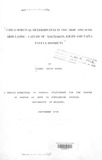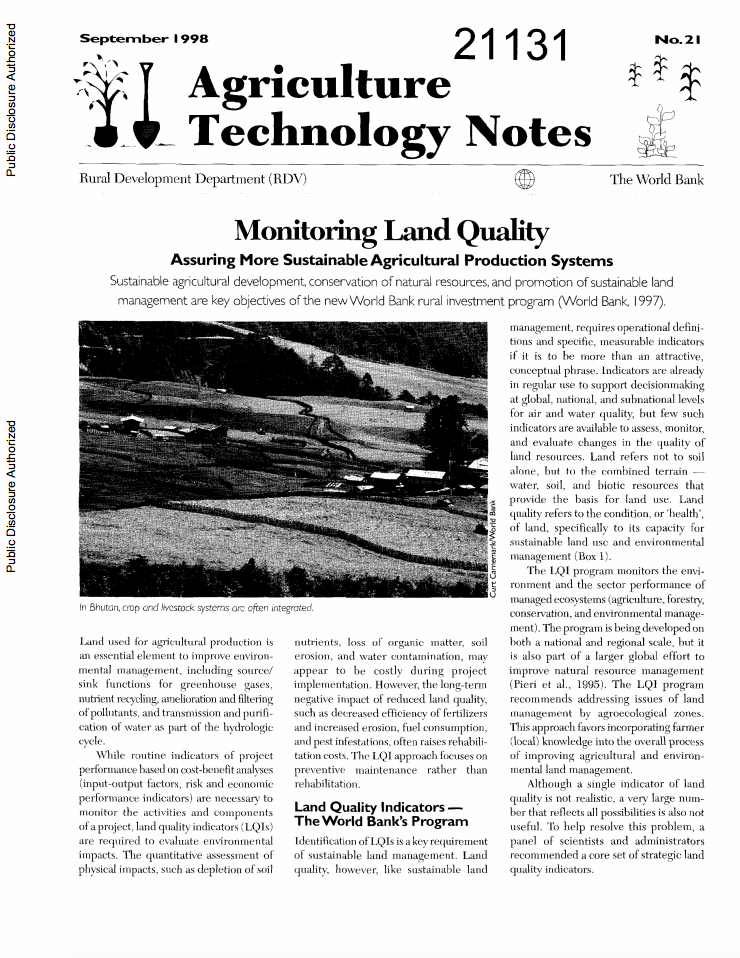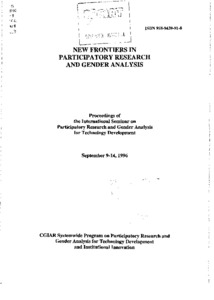Monitoring land quality : assuring more sustainable agricultural production systems
Identification of Land Quality Indicators (LQIs) is a key requirement of sustainable land management. They are required to assess, monitor, and evaluate changes in the quality of land resources and environmental impacts. The Land Quality Indicator (LQI) program monitors the environment and the sector performance of managed ecosystems. The program is being developed on a national and regional scale, but it is also part of a larger global effort to improve natural resource management. The LQI program recommends addressing issues of land management by agroecological zones.
Guidelines for Integrating Gender Analysis into Biodiversity Research
How can gender be mainstreamed into programmes concerned with the sustainable use and management of biodiversity? The International Development Research Centre (IDRC) has produced guidelines on how to integrate gender analysis into biodiversity research. The central role played by women in the maintenance of rural lands, and changing gender roles and relations resulting from cost of living rises and increased migration, are highlighted.
Land Tenure and Food Security: a review of concepts, evidence and measures
This paper attempts to build on a conceptual analysis of both land tenure and food security to set these various linkages that in a dynamic framework that captures both the effects of access to resources on food security and the effects of food security on access to and use of resources.
Impact of Access to Credit on the Poor: Research Design and Baseline Survey for a Longitudinal Study
Presents the baseline survey for a study of the impact of microfinance services offered by Alalay sa Kaunlaran sa Gitnang Luzon, Inc (ASKI). ASKI is a microfinance institution based in Cabanatuan City in the Philippines, and is a member of the BWTP Network.The baseline survey is the first step in a longitudinal process. There have been comparatively few studies in the Philippines of the impact of microfinance on poor clients.
The Economic Valuation of Tropical Forest Land Use Options: A Manual for Researchers
Manual for researchers in Southeast Asia involved in the economic evaluation of tropical forest land use options. It was developed initially to serve as an aid to Cambodian researchers in the execution of an EEPSEA-financed study of non-timber forest values in Ratanakiri Province, Cambodia. The aim of the manual is to provide non-specialists with a basic theoretical background to economic valuation of the environment and with a practical methodology for an economic evaluation of alternative tropical forest land uses.
Local law and customary practices in the study of water rights
A landscape that unites: community-led management of andean watershed resources
Beyond the farm and within the community: issues of collective action in participatory natural resource management research
Capacity for Forestry Research in the Southern African Development Community
In 1995 a survey of research capacity was conducted at institutions undertaking forestry-related research in the SADC countries. This document presents a review of the methods available for the assessment of research capacity and summarizes previous efforts to assess research capacity in the region. The methodology adopted makes use of common indicators thereby allowing comparisons across institutions.
Farmer participatory research: measuring impact
The major issues in impact assessment for farmer participatory research (FPR) are analyzed. There are many potential ways in which FPR can have an impact; for example, increasing agricultural productivity, improving the management of natural resources or leading to a wider dissemination of innovations. FPR may also be more effective in reaching specific target groups, and it many reduce research costs and develop community capacity. Impact will be measured by different groups, and for different reasons, according to the circumstances.









